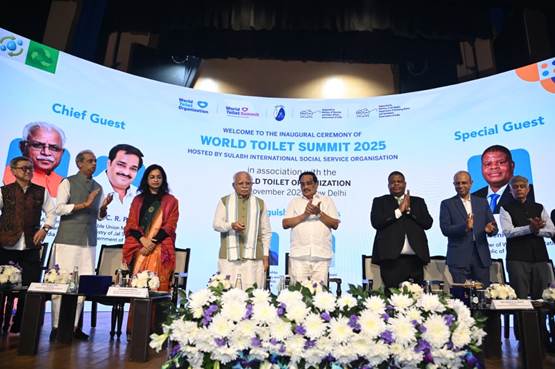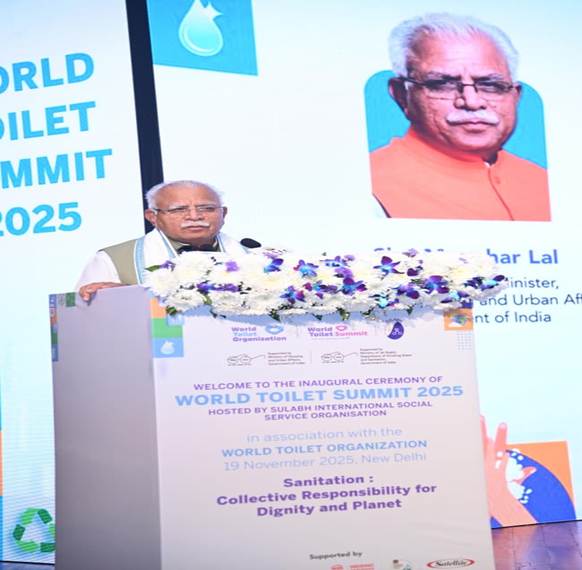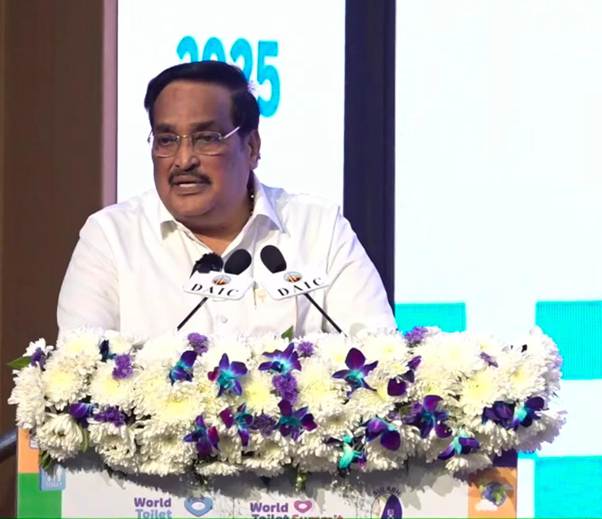Ministry of Housing & Urban Affairs
World Toilet Day 2025
Sanitation: Collective Responsibility for Dignity and Planet
MoHUA Launches ‘Toilet Paas Hai’ & ‘Main Saaf Hi Achha Hoon’—Advocacy Drive to Champion Responsible Toilet Use
Sulabh International & World Toilet Organization kickstart 3-day World Toilet Summit in collaboration with MoHUA and DDWS to accelerate sustainable sanitation and circular economy practices.
प्रविष्टि तिथि:
19 NOV 2025 5:41PM by PIB Delhi
“Sanitation: Collective Responsibility for Dignity and Planet” – The World Toilet Day 2025 theme echoes India’s holistic approach, integrating cleanliness, dignity, and environmental stewardship. Aligning with Hon’ble Prime Minister Shri Narendra Modi’s vision, India has made significant progress in expanding universal and sustainable access to these essential services. On the occasion of World Toilet Day, Sulabh International & World Toilet Organization kickstarted 3-day World Toilet summit with global stakeholders to accelerate sustainable sanitation, in the presence of Union Minister for Housing and Urban Affairs, Shri Manohar Lal & Union Minister for Jal Shakti, Shri C.R. Patil. Deputy Minister, David Mahlobo (Water & Sanitation, South Africa), ambassadors from Sri Lanka and Bhutan and representatives from 25 countries and representatives from leading organizations like HUL, BMGF, World Bank participated in the Summit.

Responding to the Hon’ble Prime Minister’s clarion call for swachhata in 2014 under the Swachh Bharat Mission, India was declared Open Defecation Free within a span of 5 years in 2019 – a remarkable milestone. The construction of toilets in every household has ensured not only cleanliness and safety but also dignity, education, and greater participation of women and girl students in society.
Rapid urbanisation and rising migration are intensifying sanitation challenges in cities, increasing the demand for high-quality toilets. With climate change putting additional strain on global WASH systems, it is becoming vital to adopt climate-resilient and sustainable sanitation solutions. The UN’s SDG-6 recognises clean water and sanitation as a fundamental human right.
With the launch of Swachh Bharat Mission–Urban (SBM-U) 2.0, India entered a new phase of urban sanitation – the journey from ODF to ODF++ and most importantly safe sanitation. As city populations grew, the demand for public toilets rose sharply. It became vital to strengthen design and sustainable management of both solid and liquid waste. Following the achievements of ODF and ODF+, the focus was on ensuring all cities achieve ODF++ status, which mandates safe sanitation and comprehensive faecal sludge management.
As per 2024 Joint Monitoring Programme (JMP) report by WHO and UNICEF, nearly 55 million urban residents in India have gained access to safely managed, improved sanitation facilities in just the past two years — a population roughly equivalent to that of France or Italy. These enhanced sanitation services have also played a significant role in reducing infant and under-five mortality rates.
Recognizing India’s diverse and challenging geographical conditions, sanitation and toilet facilities have been developed to meet regional needs. In this context, the Ministry of Housing and Urban Affairs has advanced the Swachh Bharat Mission in close coordination with missions such as AMRUT and Namami Gange. This includes the implementation of several initiatives, such as establishing sewage treatment facilities along coastal and river areas.
To elevate urban sanitation, several startups have been engaged to introduce innovative solutions across cities. To encourage such efforts, the ‘Swachhata Startup Challenge’ was launched with a focus on technology and architectural design, along with a dedicated ‘Toilet Design Challenge.’
Strengthening institutional capacity is also a key priority, and in 2024, under SBM-U 2.0, significant MoUs were signed. MoHUA signed an MoU partnering with HUL to develop PPP models for community toilets. The Ministry also partnered with Sulabh International to support the construction and efficient maintenance of toilets in high-footfall areas.
SBM-U 2.0 is now encouraging all Urban Local Bodies (ULBs) to expand public toilet (PT) infrastructure at tourist destinations, high-footfall areas, and religious sites to meet growing sanitation needs. It has also been recommended that these facilities be classified as “Aspirational Toilets.” The Mission aims to significantly enhance the user experience of public toilet services, supported by innovative models and solutions designed to ensure their long-term sustainability. So far, 29,000 Aspirational Toilet seats have been given approval under SBM-U 2.0.
Click here to know the State wise data.
Aspirational Toilets: Modern, Inclusive & Environmentally sustainable.
The Aspirational Toilets will include:
• smart features and user-friendly designs,
• accessible and inclusive infrastructure,
• gender-neutral and child-friendly facilities,
• environmentally sustainable technologies.
Across the nation, aspirational toilets were Inaugurated today. Indore Municipal Corporation inaugurated a newly constructed public toilet at Nehru Park, led by Mayor Pushyamitra Bhargav and Commissioner Dilip Kumar Yadav. Lucknow Mayor, Smt. Sushma Kharkwal inaugurated the newly built public toilet near Chowk Stadium. The event saw the presence of councillors, officials and citizens.
At the World Toilet Summit 2025, Union Minister Shri Manohar Lal called for global cooperation on swachhata and sustainability. He said, “Across India and around the world, better and cleaner toilet systems are being put in place. In our country too, mindsets are changing — and must change. After all, cleanliness is not judged by a tidy home or bedroom, but by the condition of one’s toilet”. He stressed the need for wastewater treatment, reuse, cleaner toilets, and faster behavioural change. He also underscored early sanitation habits in children and the importance of waste-to-wealth and circularity under Swachh Bharat Mission–Urban.

Union Minister for Jal Shakti, Shri C.R. Patil, highlighted the transformative impact of toilets on the lives of women, stressing that rural toilet construction has strengthened their dignity, safety, pride, and honour. “Safe sanitation and safe water are essential—and it all begins with access to toilet. In rural areas, 12 crore toilets have been constructed. With access to clean and safe toilets, annual deaths caused by diarrhoea have been prevented, saving the lives of nearly 3 lakh children every year”, he added.

Marking the World Toilet Day, MoHUA launched ‘Toilet Paas Hai’ & ‘Main Saaf Hi Achha Hoon’ - a year-long advocacy drive to champion responsible toilet use. It is aimed at promoting responsible toilet use and hygiene habits across communities. A range of advisories and training resources have also been released to strengthen urban sanitation efforts, including specialised training module - CT&PT Guide: Commonly occurring gaps and solutions for Design of Public Toilets, Intent by cities for HUL-Suvidha centres, engaging Behaviour Change Communication to develop good sanitation habits at an early stage in children - Swachh Aadatein- 21 Dinon ka Swachh Aadat Prashikshan Pathyakram.
The Inaugural Session of the World Toilet Day Summit saw participation from government, industry, international organisations, academia, innovators, and entrepreneurs will help chart a roadmap for a sustainable sanitation future. The following 2 days will cover deliberations on circular economy and climate-positive sanitation, financing models and innovative partnerships, inclusive design, construction, and O&M, technology solutions and capacity building for ULBs and elevating safety and dignity of SafaiMitras.
****
SK
(रिलीज़ आईडी: 2191751)
आगंतुक पटल : 2640